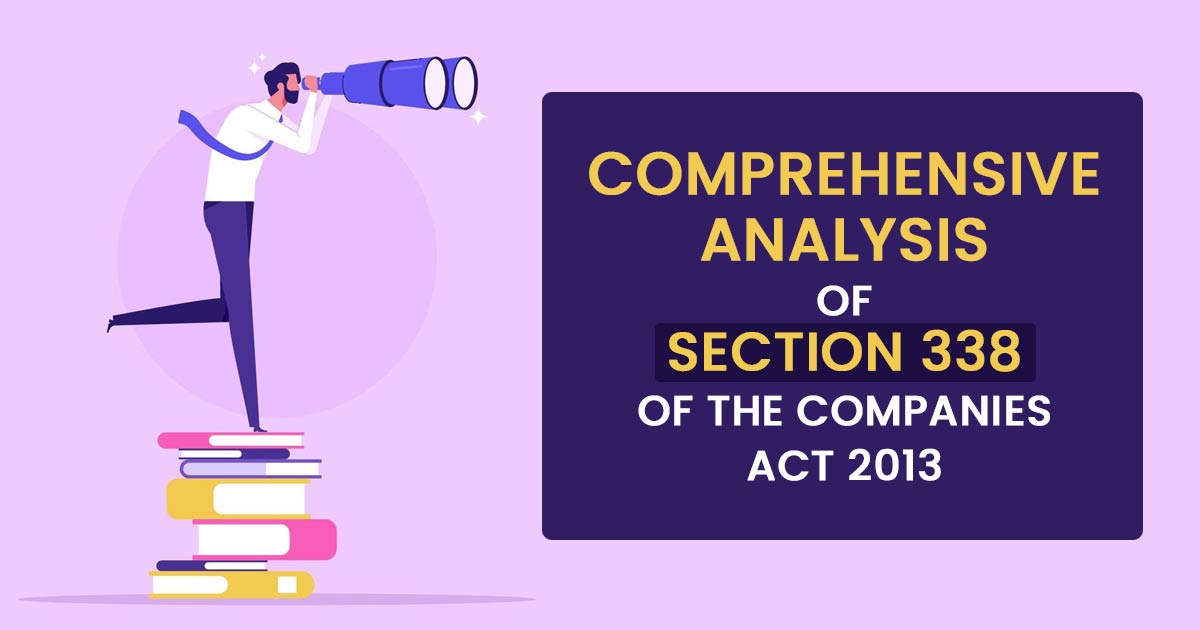
Companies must take the required steps to maintain complaints within Section 338 of the Companies Act 2013 and routinely verify their accounting records.
In 2014, the Companies Act 2013, which replaced the act of 1956 and provided an updated set of rules and regulations to regulate the functioning of companies in India, went into effect. The appropriate keeping of books of accounts as required by the legislation has received more attention and is now punishable, which is one of the significant changes brought about by the Companies Act of 2013.
What is Section 338 of the Companies Act 2013?
According to Section 338 of the Companies Act of 2013, every business must maintain the books of accounts required to fully explain its activities and financial situation as well as to guarantee that it complies with all applicable legal requirements.
Noncompliance with Section 338 of the Companies Statute 2013 is considered a criminal violation under the act and can result in serious penalties for company directors, such as a potential fine and imprisonment. This discussion goes through Section 338 obligation in cases where appropriate accounts are not kept in accordance with the Companies Act 2013.
Main Purpose of Section 338
This article’s goal is to give a thorough study of Section 338 liability in cases where appropriate accounts are not maintained in accordance with the Companies Act 2013.
These inquiries are addressed in the article:
- What are the criteria for a company’s appropriate bookkeeping under the companies act 2013?
- What sanctions apply if Section 338 of the Companies Act is not followed?
- What actions may be made to guarantee compliance with Section 338 of the Companies Act’s requirements?
Deep Analysis of Section 338 of the Companies Act 2013
Keeping Appropriate Books of Accounts Is Required Under the companies act 2013
The board of directors of every company has a responsibility to see that proper books of accounts are kept for each and every financial year, including books of accounts that explain and explain the transactions and financial position of the company, in accordance with Section 203 of the Companies Act of 2013. This covers things like income and expenses, income sources, assets, liabilities, cash flow, expenses, etc.
A corporation must also seek a statutory audit of its accounts, which must be presented to the shareholders at the company’s annual general meeting (AGM), according to Section 133 of the Companies Act.
Penalties for Violation of Section 338 of the Companies Act 2013
338 of the Companies Act, every officer in default shall be punishable with imprisonment for a minimum of one year and a maximum of three years and with a fine which shall be a minimum of Rupees one lakh and a maximum of Rupees three lakh.
Steps to Ensure Compliance with Section 338 of the Companies Act 2013
To avoid liabilities and fines, businesses must ensure that Section 338 of the Companies Act is followed. To guarantee compliance with Section 338 of the Companies Act, the following actions may be taken:
Read Also: Major Queries of New MCA V3 Portal with Solution for Stakeholders
Create an Effective Internal Control System: To guarantee that accounts are properly kept, maintained, and monitored, an effective system of internal controls must be implemented.
Appoint an Auditor who is Qualified: To undertake an annual statutory audit of its financial statements, every firm should employ a qualified auditor.
Make an Appointment with a Dedicated Accountant: To handle the daily maintenance and filing of the books of accounts, businesses should choose a qualified and experienced accountant.
Create a Compliance Checklist: To guarantee compliance with all relevant laws, rules, and standards, businesses should employ checklists.
Accounts Personnel Should be Trained: All personnel who work with accounts must have the necessary training and be made aware of Section 338 of the Companies Act’s obligations.
Closure: A company commits a criminal offence under Section 338 of the Companies Act 2013 if appropriate books of accounts are not maintained. Compliance with Section 338 is crucial to maintain accuracy in accounting records, even if the penalty for non-compliance is severe and might be extremely expensive for the business.
Companies should take the required steps to guarantee Section 338 compliance and routinely examine their accounting records to make sure they are preserved and maintained in accordance with the Companies Act’s requirements.









